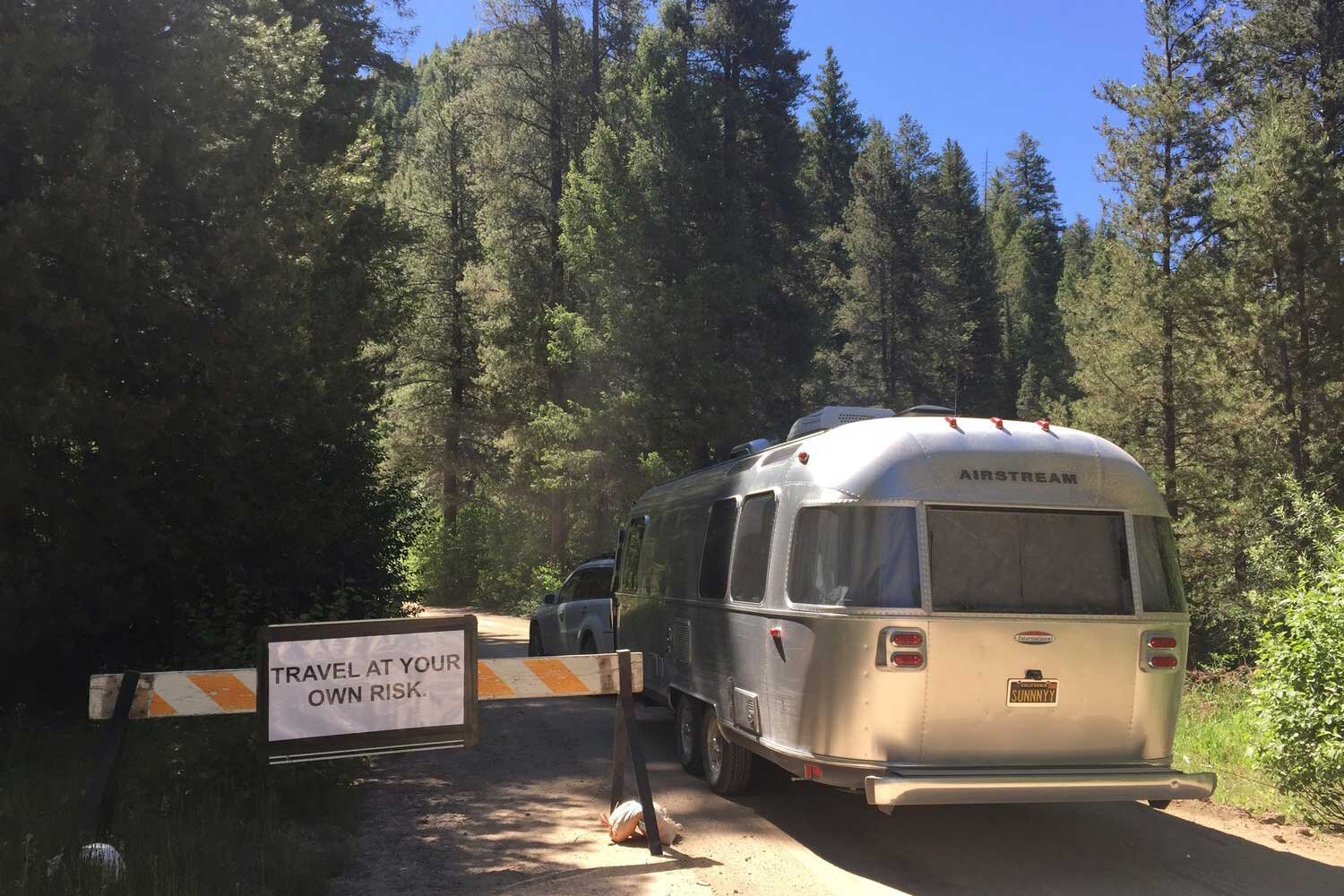3 Ways Adventuring in an Airstream Trailer Builds Emotional Intelligence
by Sarah Kivel
It has been almost three years since I purchased my 2016 Airstream Travel Trailer. I chose the 25’ Signature International because I loved the retro-modern design. I named my Airstream “Sunny.” I chose the name because “Sunny” made me think of happy, warm, sunny days. I intended to create my own living and working space during a difficult time in my life. It turned out to be one of the best decisions I’ve ever made.
I have traveled over 14,000 miles in the last three years. I have been to places like Missoula, Montana, Sun Valley, Idaho, San Diego, California, and Sedona, Arizona. I have witnessed many energizing sunrises and calming colorful sunsets. I have stayed in the middle of the beautiful Sierra Mountains as well as the Sawtooth National Forest. As I write this article, I am at my desk in Sunny, looking off into the Pacific Ocean in Half Moon Bay, California. I have done and still DO a lot! But what I didn’t expect when I bought my Airstream was WHO I would become.
My adventures in Sunny have helped me grow as a person and have helped build my Emotional Intelligence. Emotional Intelligence is the capacity to recognize our own feelings and others and manage emotions effectively in ourselves and our relationships. According to research, emotional intelligence matters twice as much as technical expertise or IQ. It accounts for 67% of the abilities necessary for superior performance. It determines the quality of our business and personal relationships (Goleman, D. Emotional Intelligence. Why It Can Matter More Than IQ. Bantam Dell. 2005).
My adventures in Sunny have helped build my Emotional Self Awareness (Goleman, D., Boyatzis, R., Davidson, R., Druskat, V., Kohlrieser, G. Building Blocks of Emotional Intelligence: Emotional Self-Awareness: A Primer. Key Step Media. 2017.), Emotional Balance (Goleman, D., Boyatzis, R., Davidson, R., Druskat, V., Kohlrieser, G. Building Blocks of Emotional Intelligence: Emotional Self-Control: A Primer. Key Step Media. 2017.), and Adaptability (Goleman, D., Boyatzis, R., Davidson, R., Druskat, V., Kohlrieser, G. Building Blocks of Emotional Intelligence: Adaptability: A Primer. Key Step Media. 2017.).
These are three of the 12 competencies that Daniel Goleman’s research has determined comprise Emotional Intelligence.
1. Self Awareness
Emotional Self Awareness is the ability to understand your own emotions and their effects on your performance. You know what you are feeling and why-and how it helps or hurts what you are trying to do. A person with strong self-awareness can describe how their feeling affects their actions. They are also able to acknowledge their strengths and weaknesses.
It was October 2017, and I had just arrived at St Francis State Beach in Half Moon Bay. I reserved site #30, one of the prime oceanfront campsites. Just as I am about to back into it, a friendly 50-something guy walks towards my car. He asks if I need any help backing into my spot.
Now, I should tell you, as a woman towing an Airstream alone much of the time, I’m frequently offered help. In fact, by the time this stranger asked to help me, I’d already traveled over 75 days across seven states. That’s 11,000 miles in two years, almost 4x across the country! I know how to back a trailer.
But the other side of this story is that my ego got in the way of accepting help for a long time. I finally realized that I denied people the gift they were trying to give me by turning down help. I also realized that I denied myself that good feeling that comes from having been given this gift. And if I was honest, backing in with help was so much easier than doing it on my own!
So, here’s this nice man offering to help me back into my campsite. So, I accept his offer and say “yes.” My window is rolled all the way down. I put the car in reverse, and, looking over my right shoulder, I start to back in. I’m listening for his guidance on which way to steer the trailer.
Suddenly, his hands come through the window, and he grabs my steering wheel! His hands are just a couple of inches away from my body! He’s steering my car in reverse! I was shocked, petrified….But I was also pissed. I pause and take a few deep breaths. Then I look him straight in the eye and say, “Please, get your hands off my steering wheel.” He turns and walks away, and I’m thinking, “Well, so much for accepting help.”
Expressing myself in this direct way was something new for me. In the past, I might have actually let this guy steer my car for me! In the past, I would have been more concerned about being unappreciative or rude and offending him and less concerned about having had my own boundaries crossed. It was situations like that where I learned to be more self-aware.
2. Emotional Balance
Emotional balance is the ability to keep your disruptive emotions and impulses in check and maintain your effectiveness under stressful or even hostile conditions. A person with emotional balance acts appropriately even in emotionally charged situations. They remain calm in stressful situations.
During one of my first long trips in the Airstream, I was driving home from Phoenix, Arizona. I had traveled there to watch my youngest daughter compete in a synchronized swim competition. I was driving on Highway 10 through the Arizona desert and making my way back into California. Suddenly my car started to shake. I could feel my heart instantly started to race, and my body starts to shake like the car. I knew I had to calm myself. I finally saw an exit. It was a small exit from the freeway with nothing but a patch of dirt. No lights, nothing. I pulled off the road and just sat there in the car. I listened to the engine for a while longer and saw that the sun was about to set. Then I noticed a truck driver in a semi-truck looking curiously at me. We were the only two people at the exit.
I had one bar left on my cell phone. Staying alone at that deserted exit overnight wasn’t smart. I decided to move on, even though my car and my hands were shaking. Within moments of making that decision, my breath started to slow, and my body started to calm.
Making a decision while under extreme stress and responding so clearly when I felt I was in danger was new for me. And my source of empowerment came from an unexpected place. Being mindful, being present, and paying attention to what was happening inside and around me came from being mindful. It came from being emotionally balanced.
I managed to drive to an RV Park I knew in Palm Springs. The owners even greeted me with warm, freshly baked cookies. And the next day, my car was fixed by a local mechanic. Had I not kept my emotions in balance during this experience, things could have turned out a lot differently.
3. Adaptability
Adaptability refers to flexibility in handling change. People who demonstrate adaptability willingly change their own ideas or approaches based on new information or changing needs. They adapt overall strategy, goals, or projects to cope with unexpected events.
In the summer of 2017, I was in the Sawtooth National Forest, just outside of Sun Valley, Idaho, on my way to Montana. I was winding along the river on a narrow dirt road. The rocks were turning into boulders, and there was no place to turn around. Then, suddenly a sign appeared out of nowhere that read “travel at your own risk.” I knew then that I was really taking a risk. As I continued down that unknown dirt road, I asked myself, “What’s the worst thing that can happen?” I figured that a boulder could damage the trailer’s underside, I could get stuck on the rocks, or I would have to back down the road to get out. I knew I could call for help with the satellite phone that I brought on the trip. And I knew I had the skill to back the trailer up if I had to. So, I decided to go for it.
I chose the less-traveled road, where things were less predictable, and I had to adapt to whatever situation would come my way. This was new for me. I didn’t know what would happen but was willing to find out. I ended up driving in reverse for about an hour to get off that dirt road. I was grateful for the adventure and grateful it was still full daylight!
Airstream adventuring has helped me develop my Emotional Intelligence. These skills have helped me in both my personal and professional life. Emotional Intelligence can be learned, just like any skill.
Here are three ways to start building your own Emotional Intelligence:
Notice how different emotions feel inside your body. Do you feel butterflies when you get nervous? Does your heart start to speed up when you are excited?
Learn to pause. The next time you are in a difficult conversation, pause for just a moment before you speak.
Practice being present. Put your cell phone away. Be present to the people around you and to what is happening around you.

